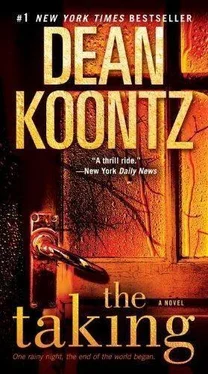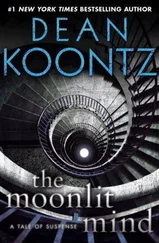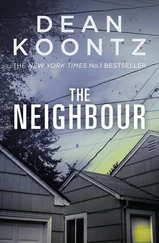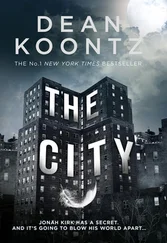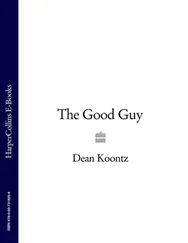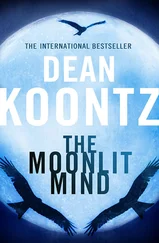Molly turned, tracking him with the pistol.
"Suspicion fell on another patient. Edison Crain, his name was. A plump, sweaty little man. Ten years before, he had raped a young boy and strangled him to death-his only known act of violence."
Second by second, the lavatory seemed less real to Molly, while simultaneously Render grew more vivid, commanding her attention, as hypnotic as a weaving cobra.
"Crain had lived ten blameless years since then, had been a model patient, and it was thought that his cure was well advanced, that he would be eligible for medically supervised release in a year or so. But the poor troubled thing must still have been eaten with guilt over the boy he did kill, and must not have trusted his own sanity. Because when suspicion fell on him, he cracked and broke, confessed to the murder of the camera boy."
Having circled a hundred eighty degrees of the room, Render stood with his back to the window, his feet in the puddle of rain.
"They transferred Crain to a maximum-security hospital, and I
well, I escaped all consequences. That was fifteen years ago, but still, when I'm lying alone in bed at night, between the desire and the spasm, the memory of strangling the boy excites me no less than the first time I resorted to it for stimulation."
Molly had been aware of a difference in him, the nature of which for a while eluded definition; but now she understood it. Render's characteristic anger was not in evidence. His hot temper had cooled.
New to him was a self-satisfied air approaching smugness. And the intense focus of a predator. The dark amusement in his voice. A glimmer of wicked merriment in his eyes.
Twenty years in the care of psychiatrists had resulted in the maturation of his raw anger into sociopathic contempt and psychotic glee; the wine of rage had become a more sophisticated, well-aged venom.
"And now my questions," he said. That smile again. Almost a smirk. "Is your mother still dead?"
Molly couldn't grasp Render's purpose in coming here. If he had meant to harm her, he could have struck her from behind instead of announcing his presence.
"Does anyone still read the dumb slut's books?"
Unreality chased surreality, round and round. Why would he travel so far only to tell the story of the strangled boy when he knew that Molly could not loathe him more than she already loathed him, or to disparage her mother when he knew that she would dismiss his slurs and insults with contempt?
"Are any of her books even in print? She was as bad a writer as she was a bad hump."
His taunting seemed designed to goad Molly into shooting him, but that made no sense. His matchless arrogance and his capacity for cruelty surely meant that he was incapable of grief or guilt. His passion was homicidal, not suicidal.
"Are any of your books in print, sweetheart? After tonight, what does it matter that you've written anything? Or that you've existed at all? You're a failed writer, a barren woman, an empty hole. Dark, dark, dark-they all go into the dark. You, too. And soon. To avoid the horrors that are coming, have you thought about turning that pistol on yourself?"
She sensed that he was about to slip out through the open window. "Don't try to leave," she warned.
He raised his eyebrows. "What-you think you can ring up the sanitarium and they'll quick send out some white-coat types with a straitjacket? The gates are open, sweetheart. Don't you realize what's happened? The gates are open. There's no authority anymore. It's dog eat dog, and every man a beast."
When he stooped to the window, the curious spell that he had cast over her was broken by his clear intent to leave.
She moved toward him. "No. Damn you, stop."
That grin again: sardonic, full of appetite and devoid of humor. "You know the story of the flood, the ark, the animals loaded two by two-all that Old Testament bullshit. But do you know why? Why the world had to end, why the judgment, the big flush, and then a whole new start?"
"Get away from the window."
"It's pertinent, sweetheart. You did the right thing once, but now your head is stuffed with twenty years of learning, which means doubts and equivocations and confusions. Now you can either shoot me in the back-again-or suck on that pistol and blow your own brains out."
Render ducked his head, hunched under the raised sash, and slid across the sill, as Molly shouted, "Neil!"
The outer rest-room door slammed open, and Neil rushed into the room as Molly reached the open window. "What's happening?"
Stooping to the window, one hand on the wet sill, pistol ready in the other, she said, "We can't just let him go."
"Who? Where?"
She leaned out of the window, head in the rain, and looked left along the alleyway, then right: the night, the storm, the suspicion of monstrosities growing nearby in secret shadows, and Render already gone.
"The corpse you planted last year in your garden,
Has it begun to sprout? Will it bloom this year?"
– T. S. Eliot, The Waste Land
AT THE BAR AGAIN, WHEN MOLLY DISCOVERED THAT strong coffee was available, she ordered a mug of it. Hot, black, thick, fragrant, it had the power, if anything did, to wake her from this dream if she were dreaming.
From the table of the tosspots, Derek waved at her. She ignored him.
Neil took coffee with her, suggesting answers to some of the things that puzzled her, though he had none of substance for the questions that were the most profound and therefore most urgent.
"So he recognized us when we passed him on the ridge road," she said. "But how did he find us here?"
"The Explorer's parked out front. He recognized it."
"If he didn't come to kill me, why did he come?"
"From what you've said, it sounded like he was
throwing down a challenge to you."
"Challenging me to what-kill him? What sense does that make?"
"None," Neil admitted.
"He called me a barren woman. How could he know?"
"There's ways he could've found out we don't have kids."
"But how could he know that we've tried so hard for seven years and that
I can't."
"He couldn't know."
"But he did."
"He was just guessing," Neil said.
"No. He knew, all right. He knew. He stuck the knife in exactly where it would hurt the most. The crude bastard called me 'an empty hole.' "
Her thoughts seemed muddled, maybe because she'd had too little sleep or because this night had been filled with too much event to process. The coffee hadn't clarified her mind yet, and perhaps even a pot of it wouldn't bring her thinking up to speed.
"Funny but
I'm glad now we didn't have children," Neil said. "I couldn't handle being unable to protect them from all this."
His left hand rested on the bar. She covered it with her right. He had such strong hands but had used them all his life in gentle pursuits.
"He quoted T. S. Eliot," she said, coming now to the thing that most mystified and most disturbed her.
"Are we back at Harry Corrigan's place?"
"No. I mean Render. He said 'between the idea and the reality' and later 'between the desire and the spasm.' They were wrapped up in his other crazy rantings, but they're lines from 'The Hollow Men.' "
"He could know Eliot is one of your favorites."
"How could he know?"
Neil considered a moment but had no answer.
"Just before he left, he said 'Dark, dark, dark-they all go into the dark,' which is more Eliot. The thing that used to be Harry Corrigan
and now Render."
She sensed that she was circling an elusive insight that, once seized and opened, would unfold into a stunning revelation.
"That lurching, head-shot Harry Corrigan wasn't really Harry," she said. "So I wonder
was my father, in the rest room, really my father?"
Читать дальше
Конец ознакомительного отрывка
Купить книгу
